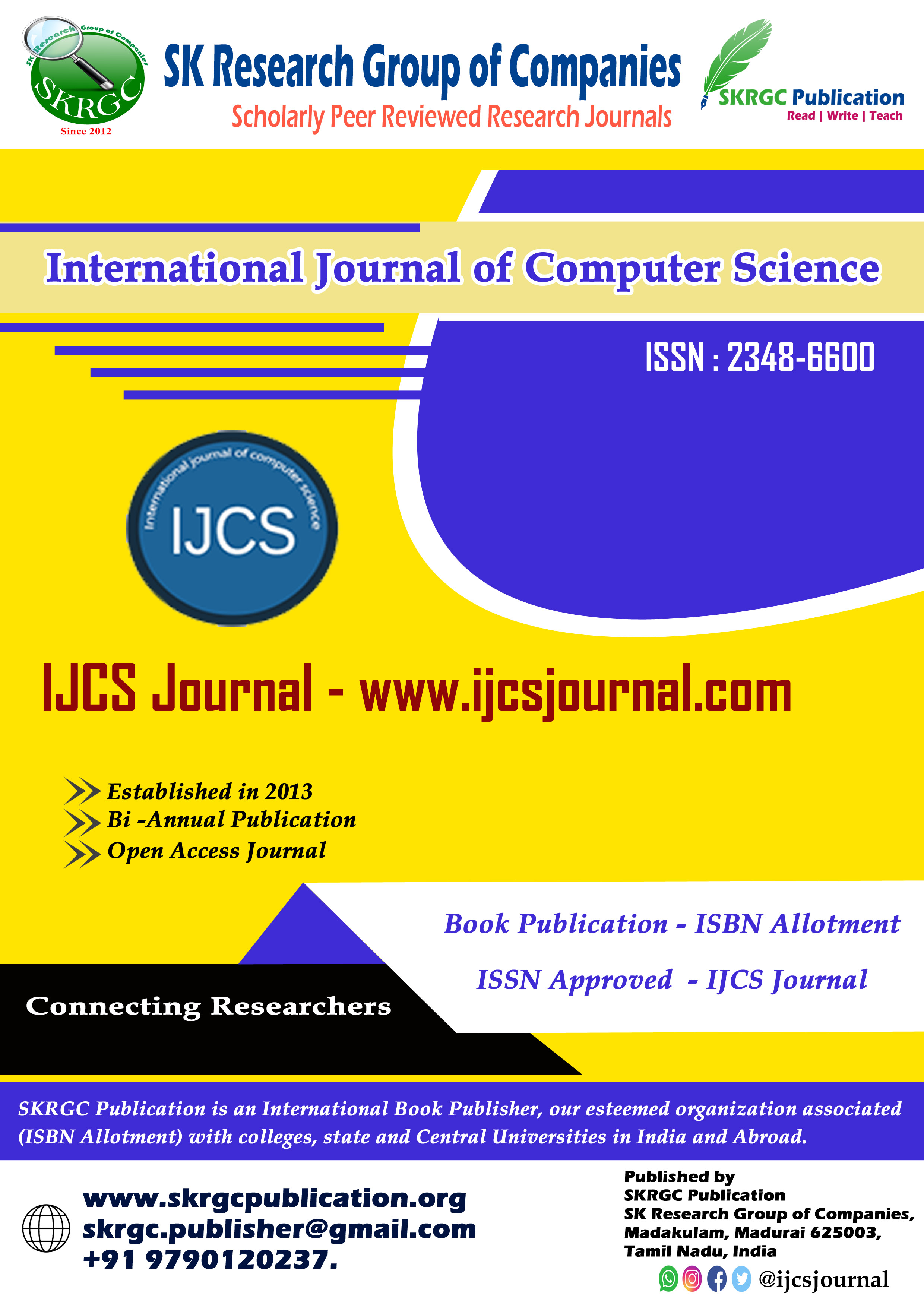HR TECH AND REVAMPED BENEFITS IN REVITALIZING CULTURE
International Journal of Computer Science (IJCS) Published by SK Research Group of Companies (SKRGC)
Download this PDF format
Abstract
During a time when technology disturbance is the standard, HR's digital change, similar to each and every part of the organization, is basic. Notwithstanding digitalization, the shift to a technology-driven plan of action requires an adjustment of an organization's way of life and reasoning. Digital change is both a strategy and an outcome. It's a progressive shift, but at the same time it's a developmental one. From minuscule undertakings to huge partnerships, digital change is an unquestionable necessity. For any firm to remain cutthroat and significant in an undeniably digital world, it is essential to adjust its objectives and techniques to the new patterns and changes going around. Numerous corporate pioneers are really uncertain of what all digital change involves. What substantial moves do we have to initiate? Do we have to make new jobs or pay a counseling firm to help us to lay out a structure for digital change? What parts of our marketable strategy ought to be modified? Is it really beneficial? All the shift of a business that was recently based on generally manual cycles to one that incorporates technology at its center in its Capabilities: Inner (employee-confronting, functional) and outside (client confronting). The consequence of digitization is change. It's not the digitizing system all by itself. Hence, the author have done this study with a view to highlight about the HR Tech and revamped benefits in revitalizing culture.
References
1. Aguilar, Gavrilova & Joshua-Gojer, Ashwini & Philpot, & Pasquini, Laura. (2015). The role of the human resources function in influencing organizational culture..
2. Anastasiu, Livia. (2009). HOW CAN THE CHANGING OF TECHNOLOGY BECOME A MOTIVATING FACTOR IN HUMAN RESOURCES MANAGEMENT corect.
3. Aneta, Yanti & Akib, Haedar & Kadji, Yulianto & Basri, Muhammad. (2014). Organizational transformation: the revitalization of the role and function for human resources (case study of PT. PLN Area Gorontalo). International Journal of Academic Research. 6. 131-135. 10.7813/2075-4124.2014/6-3/B.19.
4. Bethere, Sanita & Licite-Kurbe, Lasma. (2020). Challenges in human resource management in the culture industry in Latvia. 183-190. 10.22616/rrd.26.2020.027.
5. Bortnikas, Aleksandras. (2019). Problems with Modernizing Human Resources in The Lithuanian Service Sector. Journal of Intercultural Management. 11. 146-157. 10.2478/joim-2019-0027.
6. Chow, Irene. (2012). The roles of implementation and organizational culture in the HR–performance link. International Journal of Human Resource Management - INT J HUM RESOUR MANAG. 23. 1-19. 10.1080/09585192.2011.639553.
7. Gomez-Diaz, Carlos & Rodriguez, Jenny. (2009). HRM in Chile: The impact of Organisational culture. Employee Relations. 31. 276 - 294. 10.1108/01425450910946479.
8. Jalagat, Revenio & Aquino, Perfecto. (2022). Post-Pandemic Strategies to Revitalize the Human Resources Management in the Public Sector. 10.1007/978-981-19-3116-1_1.
9. Kim, Sunghoon & Wang, Ying & Boon, Corine. (2021). Sixty years of research on technology and human resource management: Looking back and looking forward. Human Resource Management. 60. 229-247. 10.1002/hrm.22049.
10. Mannava, Sumaja & Rekha, Dr & Srinivas, Kolachina. (2020). Organizational Culture and HR Practices Impact on Firm Performance. International Journal of Management Research and Social Science. 7. 83-88. 10.30726/ijmrss/v7.i3.2020.73015.
11. Mothersell, William & Moore, Michael & Ford, J. & Farrell, Jim. (2008). Revitalizing Human Resources Management in State Government: Moving from Transactional to Transformational HR Professionals in the State of Michigan. Public Personnel Management. 37. 77-97. 10.1177/009102600803700106.
12. Osibanjo, Omotayo & Adeniji, Anthonia. (2013). Impact of Organizational Culture on Human Resource Practices: A Study of Selected Nigerian Private Universities. Journal of Competitiveness. 5. 115-133. 10.7441/joc.2013.04.07.
13. Rahman, Habeeb & Kodikal, Rashmi & T, Bindu. (2017). CROSS CULTURAL ISSUES AND HUMAN RESOURCE MANAGEMENT OF EXPATS. Indian Journal of Scientific
Research. 8. 17834-17840. 10.24327/ijrsr.2017.0806.0429.
14. Riccucci, Norma. (2011). Revitalizing Human Resources Management. The Oxford Handbook of American Bureaucracy. 10.1093/oxfordhb/9780199238958.003.0029.
15. Rodríguez-Sánchez, José-Luis & Montero-Navarro, Antonio & Gallego-Losada, Rocío. (2019). The Opportunity Presented by Technological Innovation to Attract Valuable Human Resources. Sustainability. 11. 1-17. 10.3390/su11205785.
16. Sharma, Aditya. (2012). Human Resource Reengineering (A Radical Rethinking and Role of New Technology in HR Optimization). International Journal of Scientific Research. 2. 194-197. 10.15373/22778179/FEB2013/66.
17. Singh, Anil. (2010). A Study of HRM Practices and Organizational Culture in Selected Private Sector Organizations in India. Acta Oeconomica Pragensia. 2010. 64-80. 10.18267/j.aop.313.
18. Uslu, Tuna. (2015). Innovation Culture and Strategic Human Resource Management in Public and Private Sector within the Framework of Employee Ownership. Procedia - Social and Behavioral Sciences. 195. 1463-1470. 10.1016/j.sbspro.2015.06.445.
19. Waddill, Deborah. (2020). Technology and Its Impact on Human Resources and Business Professionals.
20. Wolor, Christian & Suhud, Usep & Nurkhin, Ahmad & Citriadin, Yudin. (2021). The Role Of Human Resources In Strengthening The Creative Industry During The Covid-19 Pandemic. Quality - Access to Success. 22. 34-39. 10.47750/QAS/22.184.04.
Keywords
Digital Transformation, HR Technologies, Changing Era, Digital Adoption, Goals & Strategies, Recent Technologies, Digitizing Process and Revitalizing Business Culture.

